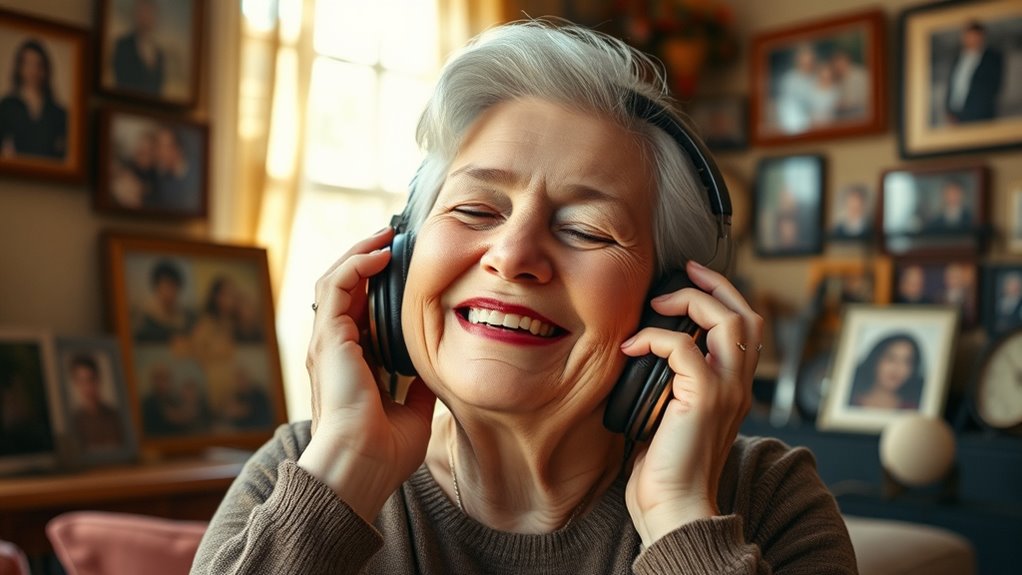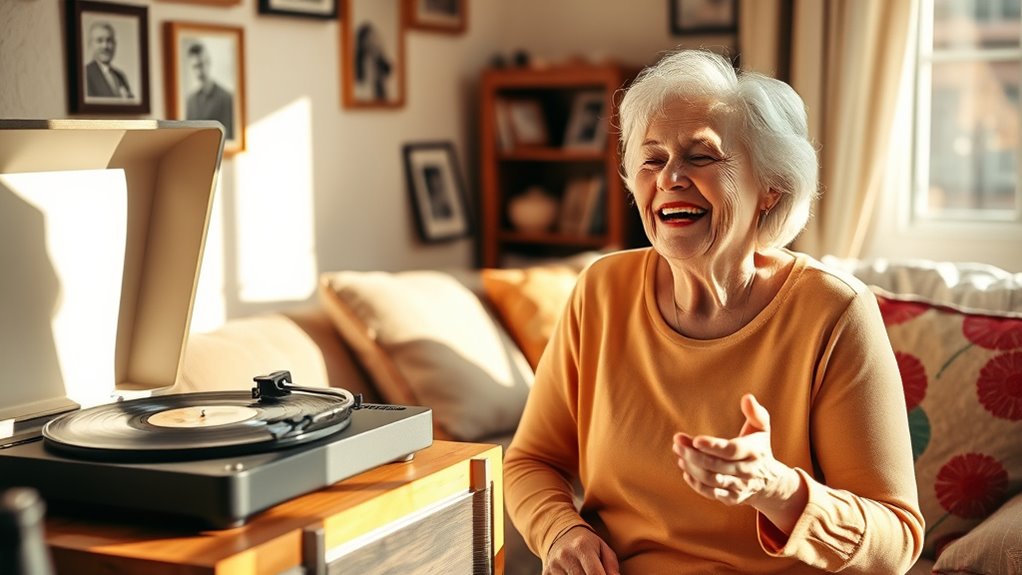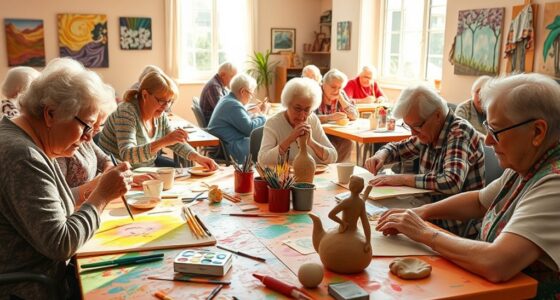Music sparks joy in seniors by activating neural pathways linked to personal memories and emotions. Familiar songs serve as powerful triggers that can evoke feelings of happiness, identity, and connection, even when words are hard to find. They bypass cognitive barriers and engage the emotional core, often bringing smiles, recognition, or singing along. If you keep exploring, you’ll discover how music’s therapeutic potential works even for those facing memory challenges and aging.
Key Takeaways
- Music activates neural pathways linked to personal memories and emotions, facilitating joyful recall in seniors.
- Familiar songs evoke positive feelings, triggering recognition and spontaneous smiling or singing.
- Personalized playlists help seniors reconnect with their identity and significant life moments.
- Musical therapy provides an emotional, non-verbal way to access memories, enhancing mood and engagement.
- Listening to meaningful tunes can strengthen neural connections, potentially slowing cognitive decline and boosting well-being.

Have you ever wondered how music can open memories hidden deep within the mind? It’s a fascinating phenomenon, and one that’s increasingly recognized for its power to reconnect seniors with their past. Musical therapy, in particular, leverages the unique ability of music to serve as a potent memory trigger. When you introduce familiar melodies or songs, you activate neural pathways linked to personal experiences and emotions. This isn’t just about entertainment; it’s a deliberate approach to stimulate cognitive functions and evoke feelings of joy, comfort, and identity.
In a typical session, musical therapy uses carefully selected tunes that hold personal significance for the individual. These are often songs from their youth or moments that marked their lives, like wedding songs, favorite childhood tunes, or popular hits from a particular era. When these melodies are played, they act as memory triggers, sparking a cascade of recollections that might have been buried or difficult to access otherwise. You might notice a senior suddenly smiling or even singing along, as if transported back in time. These moments of recognition reinforce their sense of self and can improve mood and engagement.
The beauty of using music as a memory trigger lies in its ability to bypass some of the barriers faced by traditional memory exercises. Even when verbal communication becomes challenging, music can still reach the core of a person’s emotional and cognitive framework. This is why musical therapy is often integrated into dementia and Alzheimer’s care. It provides a non-verbal, emotionally charged pathway that helps seniors reconnect with their memories and, in many cases, regain a sense of independence and purpose. The effect isn’t just fleeting; repeated exposure to familiar tunes can strengthen neural connections, potentially slowing cognitive decline.
Moreover, you don’t need to be a trained musician or therapist to harness the power of music in this way. Playing a loved one’s favorite song or creating playlists of meaningful music can have profound effects. It’s an act of love and remembrance, a way to show you care and wish to evoke treasured memories. As you see your loved one light up with recognition or even dance spontaneously, you realize that music isn’t just entertainment—it’s a bridge to their past, a tool to spark joy and preserve their identity amid the challenges of aging. In this way, music becomes more than sound; it becomes a essential part of healing, connection, and rediscovery.
Additionally, understanding the Horsepower of Electric Dirt Bikes can inspire individuals to explore innovative ways to energize their daily routines or outdoor adventures, much like how music energizes and connects seniors with their memories.
Frequently Asked Questions
Can Music Therapy Replace Traditional Dementia Treatments?
You might wonder if music therapy can replace traditional dementia treatments. While music therapy offers wonderful benefits like improving mood and memory, it shouldn’t replace standard dementia treatments. Instead, it complements them by engaging the brain in unique ways. You should consider integrating music therapy into a holistic care plan, as it can enhance quality of life but isn’t a standalone solution for managing dementia.
What Types of Music Are Most Effective for Seniors?
When choosing music for seniors, consider their genre preferences and cultural tunes. You notice that familiar genres like jazz, classical, or folk often evoke positive memories and emotions. Personalizing playlists with their favorite cultural tunes helps deepen the connection and boosts mood. By selecting music they love, you create a more engaging experience that can stimulate memory and bring joy, making the sessions more meaningful and effective.
How Can Family Members Support Musical Engagement at Home?
You can support musical engagement at home by creating personalized playlists tailored to your senior loved one’s preferences, helping them reconnect with familiar tunes. Encourage musical participation by singing along, playing simple instruments, or dancing together, making it a shared activity. Your involvement boosts their confidence and enjoyment, fostering emotional well-being. Consistent, positive interactions with music strengthen your bond and promote joy, making music an accessible source of comfort and happiness daily.
Are There Any Risks Associated With Music Therapy for Seniors?
Think of music therapy as walking a tightrope—you need balance. You should be aware of potential hearing issues that can make sounds overwhelming, and emotional overstimulation may cause distress. I once knew a senior who felt anxious during a session, highlighting these risks. While generally safe, it is crucial to monitor reactions closely and adjust volume or content to guarantee positive experiences without unintended stress.
How Does Music Influence Emotional Well-Being in Elderly Care?
You might wonder how music influences emotional well-being in elderly care. Music encourages emotional expression, helping seniors convey feelings they might struggle to articulate otherwise. It also fosters social bonding, creating shared experiences that reduce loneliness and improve mood. By engaging with music, seniors can experience increased joy and emotional comfort, which boosts overall mental health and enhances their quality of life.
Conclusion
By embracing the power of music, you can unleash joyful moments and memories for seniors, proving that a song can be worth a thousand words. When you share tunes that resonate, you create connections that transcend words. Remember, music is the universal language that touches the soul. As the saying goes, “Music is the medicine of the mind,” so keep playing those melodies — they might just brighten someone’s day.









